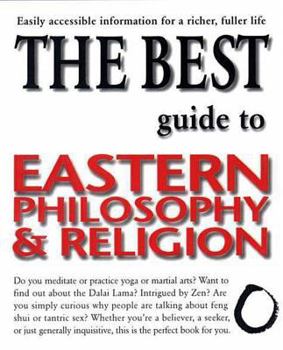The Best Guide to Eastern Philosophy and Religion
Select Format
Select Condition 
Book Overview
The Best Guide to Eastern Philosophy & Religion provides a thorough discussion of the most widely practices belief systems of the East. Author Diane Morgan understands how to direct the materialistic, linear way of Western thinking toward a comprehension of the cyclical, metaphysical essence of Eastern philosophy. With an emphasis on the tenets and customs that Wester seekers find most compelling, this text is accessible to the novice yet sophisticated...
Format:Paperback
Language:English
ISBN:1580631975
ISBN13:9781580631976
Release Date:August 2001
Publisher:St. Martins Press-3PL
Length:352 Pages
Weight:1.45 lbs.
Dimensions:0.9" x 7.3" x 9.1"
Customer Reviews
5 ratings
Very Good Introduction
Published by Thriftbooks.com User , 15 years ago
A very good introduction to Hinduism, Buddhism, Confucianism and Taoism, as well as to five other systems such as Shinto. The author's sense of humor may seem a little irreverent to some at times, and she sometimes may gloss over things a bit, but for the most part it was an interesting and insightful introduction to the various systems it covers. Certainly gives enough information to guide one to further study into details. For my part, I will be looking more deeply into Hinduism and to a lesser extent Zen and Taoism. Recommended.
Good "Comparative Religion 101" type guide
Published by Thriftbooks.com User , 18 years ago
This is certainly a notch or two above what one would expect to find in a "Dummies" or an "Idiot's" guide. Diane Morgan, who teaches philosophy and religion at Wilson and Frederick Community College in Pennsylvania, has a light touch that sometimes drifts into something close to irreverence, which might offend some sensitive readers, although the Zen Buddhist part of me found it agreeable. For example, Morgan writes about Milarepa "an important character in the development of the Kagyupa school of Tibetan Buddhism" who, during an ascetic period of his life (before he began imbibing ambrosia), lived on nettle soup "which turned his skin completely green." She observes that Milarepa died at the age of 84 "after knowingly ingesting some poisonous curds." She adds "(Curds are quite a comedown from ambrosia, but about on a par with nettle soup)." Hers is not a true believer's approach, that is for sure; and this is only to be expected. How could a true believer of any religion be objective about the nine religions/philosophies she covers? Consequently this book is written from a secular point of view with the usual assumption that no one religion or philosophy has a monopoly on truth or wisdom. The nine religions covered are Hinduism, Buddhism, Confucianism, Taoism, Jainism, Tantra, Zoroastrianism, Sikhism, and Shinto. The first four are covered in some depth, forming the first four parts of the book, while the latter five comprise the five chapters of Part 5. Strictly speaking Tantra is an adjunct of both Hinduism and Buddhism, and it is debatable whether Confucianism should be called a religion. Actually, as Morgan points out, in the East, religion and philosophy go hand in hand, and one is hard put to separate them. Needless to say it is impossible to do complete justice to even one religion in a single book. Nonetheless I think Morgan does a good job of introducing a religious and philosophical view from the East that is different from the Abrahamic and Greek traditions that are so familiar to us in the West. What she doesn't do--and I think this is a significant failing--is to make a distinction between the fundamentalist or literal interpretation of the religions and a philosophic or symbolic interpretation. In Christianity there is a world of difference between the fundamentalist and the more progressive branches, between strict interpretations of the Bible and symbolic ones. In Buddhism in particular there is a significant difference between not just the two main branches or between the Tibetan and Zen offshoots, but between the way the average Buddhist sees the world and the way the monk or the educated Buddhist sees it. The idea of reincarnation is taken as literal to most Buddhists, but a deeper understanding may require an interpretation that sees our individual "consciousness" as what is reincarnated, with the understanding that our consciousness is like fire, essentially the same in every manifestation. Also in Buddhism
Excellent introduction on this vast subject
Published by Thriftbooks.com User , 21 years ago
This is an excellent introductory book on this vast subject. It gives an excellent introduction to Hinduism, Buddhism, Confucianism, and Taoism. It then goes on describing less well known spiritual disciplines, such as: Jainism, Tantra, Zoroastrianism, Sikhism, and Shinto. The structure of the book, and its overall user friendliness reminds me of the "Dummies" series. This is if you want the Eastern Philosophy for Dummies. In my mind, this is the greatest compliment. Just like the Dummies series, this book invites you to read more on the subject covered, but gives you an excellent foundation.
This Author Knows Her Stuff!
Published by Thriftbooks.com User , 23 years ago
Though I have not yet completed this book, I am always impressed by Morgan's grasp of her subject matter and her wry delivery. This is not your average dry text. If you've got a hankering for excellent commentary on Eastern Religions, buy it. Morgan doesn't disappoint!
Witty, Wise, and Accessible
Published by Thriftbooks.com User , 23 years ago
This is quite simply the best introduction to eastern religions I have ever seen. It treats Hinduism, Buddhism, Confucianism, Taoism, Jainism, Shinto -- and even Tantra. It is full of cogent information, examples, and lots of humor. Diane Morgan has the gift of making even the most abstruse concepts clear and entertaining. For those in a hurry, an audiotape is also available. This is a must read!






